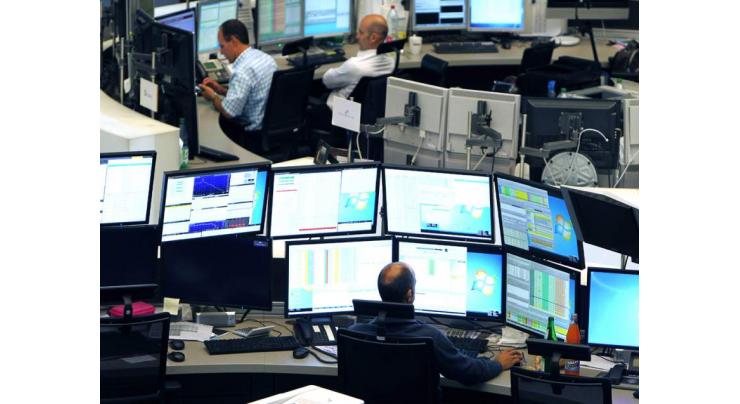
Pakistan's Stock Exchange Sinks After Int'l Oil Market Crash, Fears Of Coronavirus
Sumaira FH Published March 09, 2020 | 05:28 PM

The Pakistan Stock Exchange (PSX) benchmark KSE-100 index tumbled by over 2000 point or 5.8 percent-a single largest jerk in history in a day trading on Monday
ISLAMABAD (UrduPoint / Pakistan Point News - 9th Mar, 2020 ) :The pakistan stock exchange (PSX) benchmark KSE-100 index tumbled by over 2000 point or 5.8 percent-a single largest jerk in history in a day trading on Monday.
The index, which had closed at 38,219 points on Friday, plunged at the beginning of the day mainly owing to sharp decline of oil prices in the international market coupled with fears among the traders of worst economic impacts of coronavirus.
The KSE-100 index, a bench mark for market performance however recovered some losses after triggering a market halt which lasted for 45 minutes.
According to spokesperson of PSX, the "Market halt" procedure has been introduced by Securities and Exchange Commission of Pakistan (SECP) in psx regulations in December of 2019.
Under the new rule the action triggers when the index moves 4 % either way and remains there for 5 consecutive minutes.
"The objective of introducing market halt is to safeguard investors and market participants during volatile markets. During this halt, trading in all securities remains temporarily suspended in order to ensure a cooling off period and run a mark to market activity as a risk management measure," the spokesperson added.
He said PSX remained at the forefront to provide a fair, transparent and efficient marketplace for the benefit of investors, issuers and all stakeholders.
Talking to APP, research head Arif Habib Limited Sami Ullah Tariq said the panic selling among the traders started when regional stock markets crashed after a steep fall in oil prices.
"Since 18 percent stocks in PSX are oil related and the PSX is also heavily invested by foreign shares therefore any fluctuation in international oil prices heavily impact the local stock market." he added.
Replying to a question of chances of recovery in the market, Tariq said that the steep fall in oil prices was a positive sign for the country's economy which would also have positive impact on the stock market in days to come.
After a decline of around 2200 points at the start of session, the stock market recovered almost half of its losses later in the day as the losses reduced to 1160 points to close at 37058 points.
A total of 244,454,530 shares were traded compared to the trade 340,722,180 shares during the previous day, whereas the value of shares traded during the day stood at 11.333 billion as compared to Rs 13.342 billion during last trading day.
As many as 355 companies' transacted shares in the Stock Market Monday, out of which 67 recorded gain and 265 sustained losses whereas the share price of 23 companies remained unchanged.
The three top traded companies were, Maple Leaf with a volume of 27,254,000 shares and price per share of Rs 28.02, Fauji Cement with a volume of 25,868,500 and price per share of Rs 17.48 and Pioneer Cement with a volume of 22,320,500 and price per share of Rs 36.18.
Nestle Pakistan recorded the maximum increase of Rs100 per share, closing at Rs7000 while Colgate Palm was runner up with the increase of Rs 59.99 per share, closing at Rs 2399.99.
Philip Morris Pak recorded maximum decrease of Rs 99.96 per share, closing at Rs 1899.99 whereas Sapphire Fiber decreases Rs 61.59 per share closing at Rs 818.40.
On the global front, stock markets around Asia and beyond also plunged on the first day of trading week as panic selling set in with traders anxious over free fall in oil prices and economic impact of coronavirus. The oil markets were sparked by top exporter Saudi Arabia slashing prices to unprecedented levels.
The price of crude oil has plunged by almost 27% after Saudi Arabia, the world's top oil exporter, said it would step up production from next month, flooding global markets and most likely depressing petrol and diesel prices.
Brent crude was at $33.09 a barrel on Monday morning, a fall of 27%. It was the worst one-day fall for Brent since the start of the first Gulf war in 1991.
/395
Related Topics
Recent Stories

Today Gold Rate in Pakistan 27 May 2024

Currency Rate In Pakistan - Dollar, Euro, Pound, Riyal Rates On 26 May 2024

Today Gold Rate in Pakistan 26 May 2024

Rizwan or Imad: PCB mulls over vice-captaincy candidates ahead of T20 WC 2024

Saboor Aly gets Dubai’s Golden Visa

Pakistan elect to bowl first against England in second T20I match

Shaheen Afridi declines vice-captaincy role for T20 World Cup 2024

Former Provincial Minister Ibrahim Murad’s Efforts Boost Pakistan’s Meat Exp ..

Aleem Dar hosts 51st edition of PCB Podcast

Pakistan welcomes ICJ’s ruling on Gaza

Committee formed to plan establishment of Dasu-Chilas safe city project

T20 World Cup 2024: High ticket prices for Pakistan-India matches may disappoi ..
More Stories From Business
-

Today Gold Rate in Pakistan 27 May 2024
22 minutes ago -
FDA declares 224 colonies illegal
13 hours ago -
18,371 retailers register under FBR's Tajir Dost Scheme
15 hours ago -
President ICCI inaugurates water filtration plant in G/10 Markaz
17 hours ago -
Political will essential for successful urban regeneration: Speakers
17 hours ago -
Panwaar elected as President Traders Union KPT
18 hours ago
-
Film "Kazakh Khanate-the Golden Throne" depicts Kazak glory, statehood: Ambassador Kistafin
19 hours ago -
PFC to participate in London Tech Week expo
19 hours ago -
Call for promoting new hi-tech hybrid seeds
21 hours ago -

Currency Rate In Pakistan - Dollar, Euro, Pound, Riyal Rates On 26 May 2024
24 hours ago -

Today Gold Rate in Pakistan 26 May 2024
1 day ago -
Industry Ministry rebuts withdrawal of gas subsidy for fertilizer companies
1 day ago







